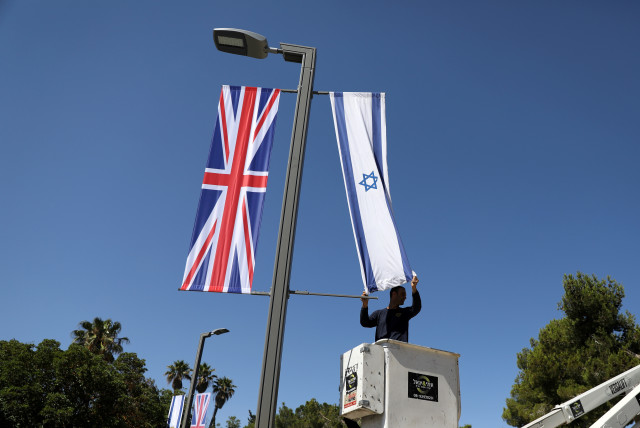Overwhelming majority of UK Jews decry Netanyahu's leadership of Israel

This rising discontent underscores deepening concerns about Israel's future and its key leaders, as seen from the international perspective.
A startling revelation has emerged from a study by the Institute for Jewish Policy Research (JPR): 79% of British Jews disapprove of Israeli Prime Minister Benjamin Netanyahu. This rising discontent underscores deepening concerns about Israel's future and its key leaders, as seen from the international perspective.
Further insights from the report show:
- While initial ratings indicate higher disapproval towards Netanyahu than other leaders like ministers Bezalel Smotrich of the Religious Zionist Party and Itamar Ben-Gvir of Otzma Yehudit, the JPR clarifies, "Netanyahu is far more well-known." Accounting only for those who voiced an opinion, Netanyahu's disapproval stands at 79%, Ben-Gvir's at 78%, with Smotrich leading at 85%.
- A more balanced view is observed towards Yair Lapid, leader of the opposition and chairman of the Yesh Atid Party. Only 34% of those who hold a view expressed disapproval.
- This JPR study is the first of its kind. Historically, "major British Jewish community organizations have typically honored Israeli politicians when they have visited the UK." Yet, recent months have shown a notable shift to criticism and even antagonism.
- Data from late 2022 revealed that disapproval ratings for Netanyahu increased by 10 percentage points over six months. This period has been significantly marked by debates over Israel's judicial reform plans, which have starkly divided Israeli society.
- On the democratic governance front, the study highlighted, "JPR data show that the pattern with Jews in the UK is similar, only more so, with levels of pessimism outscoring levels of optimism by 72% to 18%."
- Concerning Israel’s security, 58% of Jews in the UK expressed pessimism, while 32% showed optimism. These sentiments closely mirror the figures in Israel.
- The broader perspective on Israel's situation is even more concerning among UK Jews than those in Israel. According to historical data from the IDI, Israeli concerns "have not been this high for about fifteen years, and they have risen sharply since 2020."
Why do British Jews now disapprove of Netanyahu?
JPR's executive director, Dr. Jonathan Boyd, weighed in on the study's findings, stating, "Israeli society is currently struggling vigorously over the future direction of the country. As this issue plays out on the streets of Jerusalem and Tel Aviv, Jews across the UK are compelled to question not just if they support Israel, but which Israel they support. The data suggest that tensions in Israel might reverberate in Diaspora Jewish communities, with signs of strain already evident in the UK."
The British Jewish population, as of the 2021 Census, stood at 277,214 for English and Welsh Jews. When including the Scottish Jewish count from the 2011 Census, the core Jewish population in 2018 reached approximately 290,000. An enlarged figure, accounting for non-Jewish relatives of Jews, brought the number up to 370,000 in 2018. A 2007 study by the University of Manchester revealed that 75% of British Jewish births were to the Haredi community, with Ultra-Orthodox women having an average of 6.9 children, compared to secular Jewish women's 1.65. Moreover, the Orthodox community's growth in England was nearly 5% annually by 2015, while the non-haredi community shrunk by 0.3% per year.
In terms of religious infrastructure, Britain is home to roughly 454 synagogues. A 2016 estimate indicated that 56.3% of UK households with at least one Jewish member held synagogue membership. The distribution among specific denominations saw the Orthodox sect, encompassing the United Synagogue and the Federation of Synagogues, among others, leading at 42.8%. They were followed by the strictly Orthodox at 23.5%, Reform at 19.3%, liberal at 8.2%, Masorti at 3.3%, and Sephardi at 2.9%.
Self-identification among Jews in the UK varies: 34% consider themselves secular, 18% ultra-Orthodox, 14% each for Modern Orthodox and Reform, 10% are traditional but not very religious, 6% liberal, and 2% each for Conservative and Sephardi. It's notable that the Stanmore and Canons Park Synagogue in the London Borough of Harrow claimed in 2015 to have the most extensive membership of any single Orthodox synagogue in Europe.
Jerusalem Post Store
`; document.getElementById("linkPremium").innerHTML = cont; var divWithLink = document.getElementById("premium-link"); if (divWithLink !== null && divWithLink !== 'undefined') { divWithLink.style.border = "solid 1px #cb0f3e"; divWithLink.style.textAlign = "center"; divWithLink.style.marginBottom = "15px"; divWithLink.style.marginTop = "15px"; divWithLink.style.width = "100%"; divWithLink.style.backgroundColor = "#122952"; divWithLink.style.color = "#ffffff"; divWithLink.style.lineHeight = "1.5"; } } (function (v, i) { });

